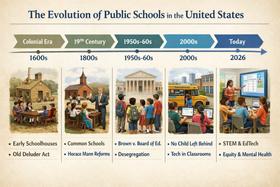In the efforts to ramp up the public education system in the United States, new national standards have been proposed to be the next logical step. In the past, standards were left up to individual states, which created huge variances in what and how children were taught. It also created disparities when it came to preparing students for higher education. Something had to be done, educators and lawmakers decided. Hence, common core standards were born.
What are Common Core Standards?
Common core standards were developed by the National Governors Association Center for Best Practices and the Council of Chief State School Officers. Standards were developed with input from educators and administrators from around the country. The standards focus on English Language Arts and Mathematics, but standards span across other core subjects taught in public schools from kindergarten to 12th grade. Common core standards are now in place for pre-kindergarten instruction to ensure every student is fully prepared to enter public school.
According to the Common Core State Standards Initiative website, the standards are designed to provide students with the appropriate knowledge and skills throughout their K-12 education. Key features of the core standards initiative include:
- Easy to understand and consistent
- Build on current standards for individual states
- Are competitive with standards in other top-performing countries
- Line up with current expectations for college and the workforce
- Include rigorous content and knowledge application
- Are evidence-based for easy assessment
U.S. News and World Report states that these common core standards for language arts and math have now been adopted in 45 states and the District of Columbia. In addition, 26 states have already signed on for the Next Generation Science Standards, which were developed through a separate collaboration and have been endorsed by the National Science Teacher Association and the National Research Council. Now, plans are in place to revamp all 34 Advanced Placement courses currently offered by College Board in order to bring them in line with the common core standards. In addition, the collaborators of the common core standards plan to introduce standards for additional subjects in the future.
Potential Benefits of Common Core Standards
The common core standards have been touted by many educators as offering significant benefits to students. According to the website for the National PTA, parents should expect teachers to subscribe to a core set of standards much the same way they expect their children’s doctors and dentists to do. The standards offer consistency across state lines and even district lines, ensuring students receive the same quality of education regardless of location, income level, or ethnicity.
Common core standards offer the following benefits to students:
- Allow students moving from one state to another a smoother academic transition
- Help students understand what is expected of them in terms of academic performance
- Provides students with the necessary skills and knowledge for college and the workforce
The standards also provide benefits to parents, including:
- Facilitate communication between parents and teachers
- Give parents accurate benchmarks they can help their children achieve
- Assure parents' children get the same quality of education regardless of location
According to the PTA website, common core standards are also a boon to teachers. These advantages include:
- Facilitate the development of a curriculum that promotes a higher level of thinking
- Allow for more effective collaboration and professional development
- Provide teachers with more time to go deeper into subjects
With the large majority of states adopting the common core standards today, it does appear that most educators across the country are embracing the standards as the new benchmarks and guidelines for public education today. However, the standards are not without their share of challenges – or critics.
This video explains the benefits of Common Core Standards.
The Challenge of Common Core Standards
U.S. News and World Report has stated that implementing common core standards could pose some challenges to educators. This news came from education experts who recently spoke at the Education Nation summit in New York. One of the biggest challenges could be funding the new standards, which is difficult to do at a time when many school budgets are already stretched to their limits. The other challenge will be simply in the fact that implementation of the standards will change many aspects of the education system as we know it today.
“It’s going to change what we teach…how we teach and what materials we use to teach…how we decide who’s ready to graduate from high school and…who gets into college, and how we prepare teachers,” Chester Finn, president of the Thomas B. Fordham Institute, and education think tank, told U.S. News and World Report.
However, teachers agree that the simple consistency of the standards will aid in the collaboration process, effectively minimizing some of those challenges.
This video outlines opposition to Common Core Standards.
Opposition to Common Core Standards
Although most educators appear to be on board with the common core standards today, some are still vehemently opposed to the idea. Veteran teacher and administrator Marion Brady wrote a scathing op-ed for the Washington Post regarding the standards, which he asserts will attach standards to the topic rather than the quality of the young mind. He also argues that the standards ignore the real reason behind poor academic performance: childhood poverty. Brady further states that the standards are a “set-up” for standardized tests, which fail to take into account non-verbal learning and cultural biases.
Despite some opposition to the idea and significant challenges in implementing the system, common core standards are forging a path in public schools throughout most of the country. Time will tell if this revamp to the education system will better prepare our youth to become a competitive force in the global marketplace.
Questions? Contact us on Facebook @publicschoolreview.












